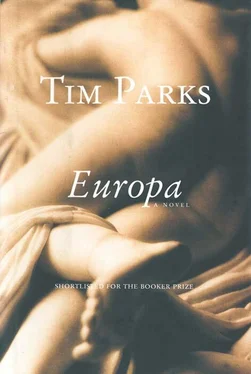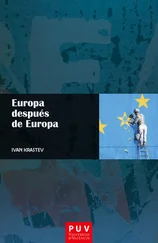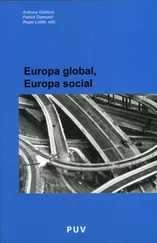Tim Parks - Europa
Здесь есть возможность читать онлайн «Tim Parks - Europa» весь текст электронной книги совершенно бесплатно (целиком полную версию без сокращений). В некоторых случаях можно слушать аудио, скачать через торрент в формате fb2 и присутствует краткое содержание. Год выпуска: 1999, Издательство: Arcade Publishing, Жанр: Современная проза, на английском языке. Описание произведения, (предисловие) а так же отзывы посетителей доступны на портале библиотеки ЛибКат.
- Название:Europa
- Автор:
- Издательство:Arcade Publishing
- Жанр:
- Год:1999
- ISBN:нет данных
- Рейтинг книги:3 / 5. Голосов: 1
-
Избранное:Добавить в избранное
- Отзывы:
-
Ваша оценка:
- 60
- 1
- 2
- 3
- 4
- 5
Europa: краткое содержание, описание и аннотация
Предлагаем к чтению аннотацию, описание, краткое содержание или предисловие (зависит от того, что написал сам автор книги «Europa»). Если вы не нашли необходимую информацию о книге — напишите в комментариях, мы постараемся отыскать её.
Europa — читать онлайн бесплатно полную книгу (весь текст) целиком
Ниже представлен текст книги, разбитый по страницам. Система сохранения места последней прочитанной страницы, позволяет с удобством читать онлайн бесплатно книгу «Europa», без необходимости каждый раз заново искать на чём Вы остановились. Поставьте закладку, и сможете в любой момент перейти на страницу, на которой закончили чтение.
Интервал:
Закладка:
Yes, I am caught now, I am not in my small flat where the answering machine vets all the calls and where no photograph, ornament, poster or object of any intimacy whatever dates back before 1993, not in my own private space so dear to me and so dull, but here in the thrall of forty or fifty people. You are caught, I tell myself, trapped. And despite my late arrival, due mainly to a half-hour spent in a café on Corso Sempione debating all the reasons for avoiding this ridiculous excursion (without ever for one moment believing I would avoid it), despite my late arrival and all my misgivings, I must say that the thought that I really am in this now is beginning to get me rather excited, it’s cheering me up, so that already I am considering indulging in a little fling, an avventura as the Italians say, with one, with any one for heaven’s sake (for they are all the same to me — how could it be otherwise?) of these young women. You should have an adventure, I tell myself, looking around at the fresh young students, a little fling, in full visibility of everybody, flagrant. By which of course I mean in full and flagrant visibility of her . As if such a gesture could in any way upset her! As if she would care, which I know perfectly well she wouldn’t. On the contrary she would probably say, if we were to speak to each other at all on this trip, which frankly I doubt, she would probably say how pleased she was that I was having a healthy sex life , a notion this, whatever it might mean, that she always advocated and indeed used, as a precept , to excuse almost any behaviour, and by any behaviour what I mean I suppose is betrayal, which is surely the most terrible behaviour of all, and the most inevitable it seems sometimes. And this reminds me now how, with her historical studies, so similar to my own, and her desire for sophistication, or at least to be seen to be sophisticated, she liked to say that European hegemony in the world began with a woman’s betrayal, and she meant Helen, Helen’s betrayal, which prompted the Achaean triumph and the shift of civilization’s centre from east to west, Troy to Athens and thence of course further west to her beloved Paris. Another protagonist. Every epic adventure (I remember her saying this and myself thinking how intelligent she was and how well-read and articulate), every epic adventure turned on a woman’s betrayal, of father, family, or husband — Medea, Antigone, Ariadne — and she would laugh her laugh, her liquid French laugh, and whenever history’s wheel began to move, she said, it was betrayal set it in motion — Hitler’s of Stalin, De Gaulle’s of Britain — and she said that so long as we saw our affair in the wider world perspective I need never worry about feeling guilty or justifying myself.
She laughed her very French laugh. And if I mention that a second time, the Frenchness of her laugh, it’s because I’ve just remembered that I found her laugh special and I’m trying to remember exactly what it was like, because so often one remembers that something is, was, wonderful or special without being able properly to recall it, or properly to savour it, or understand exactly why it was so. One remembers that one would like to recall it. One remembers in order to be frustrated, in order to savour not the thing itself but its absence, the shape of its absence. And thinking of this while sitting slightly “right of centre — on the big back seat of this big packed coach with Vikram Griffiths launching into his amplified speech somewhere on the autostrada north of Milan, clearing his throat, his ridiculous mongrel dog Dafydd snuffling round his legs, grizzly wet nose patted by all the girls, it occurs to me that one of the main things I fell in love with when falling in love with her was her foreignness , and the remarkable thing about this is that I had already fallen in love with foreignness once before, of course — my wife — with hardly spectacular results, and here I was doing it again, so that you might well suppose that if I were to go to live in Africa or Asia or Russia or the far north or the polar south, if I had the energy, that is, or the courage or optimism to move around like that, as some people so amazingly do, I would probably fall in love with foreignness over and over again and be at the mercy of every different cut of female lips, eyes and nose, every different cadence of female vocal cords, every language, gaze and gait, since quite probably it is foreignness and only foreignness that is capable of making me fall in love, lose control, approach a state of adoration — except of course that I’m perfectly aware that I shall never fall in love again.
Nor would I want to.
Nor am I remotely interested in thinking about such matters, or in reading about them, or in talking about them, so that if I do think and read and talk about them incessantly, then it is presumably because I am compelled to do so. Presumably.
I’m at sea again, that’s the truth, clutching the very bad book my eighteen-year-old daughter gave me, sitting amongst a coachload of sirens and ne’er-do-wells, while at the front, microphone in hand, Vikram Griffiths — and apparently he explained to the coach driver that he absolutely had to bring his dog along, because if he left it with the wife he is separating from she would never give it back to him — is explaining in a surely exaggerated Welsh Italian (but he knows how much people love his quaint, or as they put it folkloristico incompetence, his extraordinary mixed-ness and minority-ness) the reasons for our trip, id est ,the unlawful, on the part of the University, reduction of our salary, the attempt to limit to four the number of years we can renew our contracts, the threat of firing, the misrepresentation under oath of the nature of the work we do (i.e. our professors’ work), the refusal to comply with court orders, even orders emanating from the European Court, the arrogance in short of the Italian state in its dealings with us through the University and hence our decision to take a petition to the European Parliament and to insist that pressure be brought to bear to reinstate those of us who have been fired, return our salaries to what they were and pay damages for lost salary and likewise for the psychological distress brought about by this illegal and disreputable way of treating us.
Am I right or am I right? Vikram Griffiths shouts (in Italian, demotic), upon which everybody claps and cheers, the dog Dafydd barks and is made a fuss of, since women so love to make an exhibition of their affections, chasing his tail wildly, and now Vikram, sucking in catarrh, thanks the students who have come along for their solidarity and he says how impressed officials at the European Parliament will be by this broadly-based support since it indicates that the students have a rapport with their foreign-language teachers and are aware and care, and the press will surely notice this and hence the University will be forced to take note too, since the last thing they need is for the classrooms to be occupied.
Is he right or is he right?
There is another loud, mainly feminine cheer with canine echo and Vikram Griffiths, stocky, charming, brilliant, makes a mistake, whether of grammar or of stress, or of both — of both — with almost every Italian word he utters, though apparently he speaks Welsh perfectly, and what he is not saying of course to these students who have come along to support us, and in some cases one imagines with genuine altruism, sacrificing precious hours and days that they could have used revising for the exams that are to be held immediately upon our return — what he does not say is how little work we foreign lectors do for our living, how long and lazy our summer holidays are, how little some of us are qualified, how many of us got our jobs because we just happened to know the professor with the gift in his hand, and one of us is having a lesbian relationship with her professor and another is taking money together with his professor to fix exams on behalf of rich and incompetent students, and many of us worked for our professors privately in language schools and translation agencies before we got our jobs, so that getting them was just an extension of an already established collaborazione , as the Italians like to put it, and he doesn’t say that many of us have been deeply corrupted by receiving an easy and not ungenerous salary for work that nobody checks or even remotely cares about, and that most of us are terrified by the idea of having to go out and find other work and actually make our money in some way that corresponds, however remotely, to the amount of effort we put in. You yourself are terrified, I tell myself, by the prospect of having to find other work. Why else would you have stayed for so long? And Vikram Griffiths, with his handsome sideburns, his subcontinental charisma, and his dog named after the great (apparently) Welsh poet Dafydd ap Gwilym, a man who revolutionized forever the metrics of that language now spoken by so few, Vikram does not say that when we arrived at the University long ago each one of us signed a contract in which we accepted that the maximum duration of our job would be five years, because of course we imagined that we would use this time to become something else — a writer, a painter, a mother, a professor, an entrepreneur — but that by the end of those five years, our various private projects having failed, or not having satisfied us as we expected, we couldn’t leave, we could, not give up our empty jobs.
Читать дальшеИнтервал:
Закладка:
Похожие книги на «Europa»
Представляем Вашему вниманию похожие книги на «Europa» списком для выбора. Мы отобрали схожую по названию и смыслу литературу в надежде предоставить читателям больше вариантов отыскать новые, интересные, ещё непрочитанные произведения.
Обсуждение, отзывы о книге «Europa» и просто собственные мнения читателей. Оставьте ваши комментарии, напишите, что Вы думаете о произведении, его смысле или главных героях. Укажите что конкретно понравилось, а что нет, и почему Вы так считаете.












